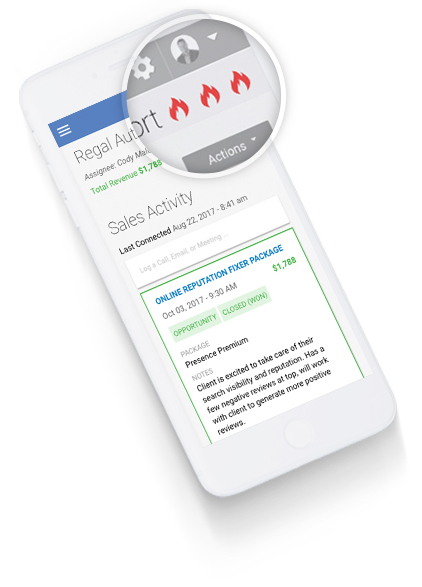Sales Hangovers: How to Maintain High Sales Performance
The dreaded sales hangover.
You’re probably wondering what exactly that is (no, it doesn’t actually involve a hangover from the night before) 
(okay its not a real definition per say, but it does happen)
Picture this: It’s a regular Wednesday. Your best salesperson recently closed the most deals that they ever have in one day—but you’re now noticing a decline in their sales performance.
What happened?!
Nothing else is different, but for whatever reason, performance seems to have declined. The high they had from their big win has fizzled out, and it’s your job to reignite their passions.
Winning can go two ways. either it inspires euphoria and makes a salesperson feel like they can now win anything, or they develop that what’s next? feeling that will cause productivity to fall.

It’s your job as a sales manager to motivate your sales team to consistently push for those big wins. To keep your sales team lean, mean, and high-performing, you will need to incorporate more than just one singular method.
Your sales team must be always working to improve their sales performance, or else your revenue will take a serious hit (no pressure). The good news? There are endless ways to instill that sales passion in your team. Read on for some great sales team management tactics if you’re ready to make performance a priority!
No flying solo.
Monitoring performance is the most important aspect of sales because it provides the information needed for the salesperson and manager to make real time adjustments, and watch how those changes impact results. - Aaron Leblanc, Director of Enterprise Sales
Keep your team focused—eyes on the ball. Just as it’s important to keep a constant eye on your team, it’s as important that they are holding themselves accountable as well. They need to want to achieve their goals, not only because you are nagging them to.
1) Call updates
Scheduling call updates with your sales reps ensures that managers are regularly updated on the efforts and activity of their team, and serves as a reminder to your team to consider how many calls they are making and if it’s enough.
2) One-on-Ones
One-on-one meetings with each sales rep is a great way to open up a conversation for improvements that need to be made outside of the competitive sales environment. It’s an ideal time to talk about personal goal setting and setting expectations between the sales manager and individual sales reps.
3) Stand-Up Meetings
Daily “Stand-Ups” are a great tool for better communication among your sales team. By briefly meeting in the morning as one team, you’re able to discuss what was accomplished the previous day, what is on the agenda for the day ahead, and set the managers’ expectations for the day.
It’s important to note that stand-ups aren’t just another meeting to show up to; make certain that the time is being used as a teaching moment to engage with your team, share a big win, and share a few motivating words to instill some confidence for the day ahead.
4) Line-by-line for the Pipeline
Going through the pipeline with your sales rep holds them accountable for their efforts towards each prospect. It’s important to look at prospect opportunities expected to close that month and come up with specific strategies to close each deal.
5) Team Training
A training refresher is a always a good idea to combat the ever-changing sales game. Buyers’ needs are always changing, which means that your skills may need to change along with them. Team training is an organized time to get together and talk how you’re winning as a group, as well as how you’re going to stay on top.
The Best Motivator is Sitting Among Them.
As a sales manager, you’re always wondering how you can inspire your sales team, but your best motivator may be sitting right beside you.
Why not utilize the knowledge and skills of your best salesperson to your advantage to inspire better performance in you sales team? Sounds like a no-brainer.
Give your best salespeople the opportunity to host presentations, run stand-up meetings, and share their stories and experiences with the team. By doing this, you’re setting an example of your expectations for your team, as well as acknowledging the great work your senior salespeople are doing.
Bonus Tip: Ask your salespeople to collaborate with marketing to create new content for your company blog. This content can share tips on achieving sales wins, celebrating and rewarding successes, the best sales tactics that work for your team—your sales experts will create the best content on sales.
Even the small wins are worth celebrating.
Your lead salespeople might be miles ahead in numbers and experience too far to surpass—but there are various ways to celebrate sales wins that don’t involve being the top salesperson.
It’s impossible to win all the time, and it’s important to manage expectations among even the most competitive teams. If your sales team feels like being the top salesperson is the only way to get recognition, they may feel more discouraged in trying to take risks and close those challenging deals.
It’s important to celebrate their efforts, especially when they’re exceeding your expectations or you’re noticing improvements in their sales performance. The best managers generally criticize in private and compliment in public. When you’re giving your sales reps constructive criticism it’s important to:
- Be specific about what aspect of their performance you want them to change
- Have an open discussion to why this person may not be performing up to your standards
- Explain why their current performance is not acceptable
- Offer advice or solution to the problem
- Allow time for their questions
Keep motivating, encouraging, and monitoring their sales performance. Even small, incremental wins will have a positive impact on productivity, performance, and overall job happiness. Research by the Harvard Business Review showed that research participants who only reported minor steps forward still evoked positive reactions and higher motivation.
Try changing it up by giving someone else a chance to lead a meeting and tell the team what’s been working for them—this gives them the opportunity to show off their own small wins, even if they don’t have a top spot on the team.
Intrinsic or Extrinsic Motivation? It’s a trick question—you need both.
You’re probably wondering how a manager could work intrinsic motivation into a SALES position when it would have to compete with commission. We won’t pretend like commission isn’t the big factor that drives motivation in sales roles, but giving a greater meaning to the role than money will help a salesperson to understand they aren’t just someone who makes calls.
Inspire them. The B2B buyer's journey is becoming increasingly complex, and salespeople play a crucial role in driving the entire company’s revenue. Give your salespeople a sense of pride by reminding them they are helping SMBs to find the right products and services to grow their business for the better and help them to succeed against the big box stores.
The central driver of creative, productive performance was the quality of a person’s inner work life—the mix of emotions, motivations, and perceptions over the course of a workday. How happy workers feel; how motivated they are by an intrinsic interest in the work; how positively they view their organization, their management, their team, their work, and themselves. . . — Harvard Business Review
The sales role is one job that has yet to be automated, because it requires the ability to foster human connections, understand technology, and be able to deliver value to their customers.
Above commission, show your team that they are valued.
The good old-fashioned sales contest.
As we mentioned above, many salespeople are driven by monetary compensation, incentives, and competition among the team.
According to a Frost survey, 80% of sales leaders conduct regular sales contests for their teams, with 47% of sales leaders finding them highly effective. It’s no secret that competition is a great motivator among sales cultures. It’s tough to make objectives fun, but introducing competition is a great tool to spice things up.
Come up with a challenge or competition for your sales team is based on efforts and chose a prize that will be a motivator for your team. For Example: Cold-Calling Competition.
- Chose one day of the week and block out a few hours from everyone’s schedule.
- Inform your team of the competition and what prize the winner will receive.
- Watch as your team works to revive dead leads or discover new ones.
- The first person to reach 5 call connects gets 50 bucks.
It’s as easy as that!
Sales Hangover No More!
If you’re constantly working to motivate and inspire your team, productivity will be an issue of the past. By utilizing tools like Vendasta's Snapshot Report it will save you time by automating your sales pipeline, prospecting, and data entry. This way you and your team can focus more on making connections and less on sales chores that will only prolong the sales hangover.
By making a few changes to the way you manage your team, you will see a difference in their sense of achievement and heightened performance.


